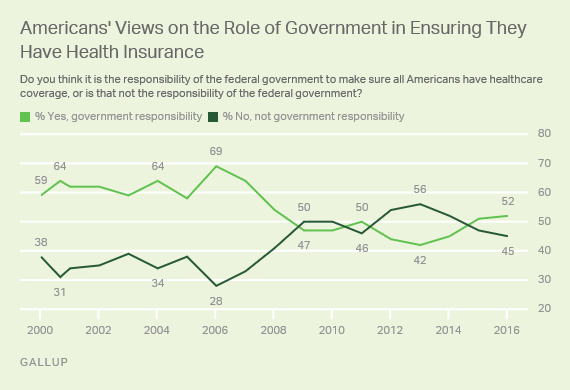Gallup released a new survey suggesting that since the enactment of the ACA, the percentage of Americans who think “the responsibility of the federal government to make sure all Americans have healthcare coverage” has decreased.

Gallup observes:
Compared with today, Americans were more widely inclined to say ensuring healthcare coverage is a federal responsibility between 2000 and 2008, with majorities of 54% to 69% saying this. But as President Barack Obama’s Affordable Care Act was debated and implemented, the issue became politicized, leading to a nearly even division on the question from 2009 to 2011.
By 2012, sentiment against healthcare being a government responsibility swelled to 54%, and it remained the majority view through 2014. But last year’s poll found Americans shifting more toward the view that the government should ensure all have healthcare, and this holds today.
One of the greatest failings of the ACA’s party-line vote was that roughly half the country did not participate in a massive expansion of federal power over healthcare. As I discuss in Unraveled, this same contingency had no problem opposing it, even after it was enacted. This further polarized critical discussions of public health.
I included this passage from the Epilogue of Unraveled, which is more true today in light of these numbers:
The ACA’s polarized history complicates its future. Going forward, public health discussions will be inextricably interwoven with partisan rancor. University of Chicago health law professor Harold Pollack lamented that “so many promising [health care] delivery reforms are tinged by their association with President Obama’s signature domestic policy achievement.” In 2017, and beyond, any effort to unravel health care and politics will prove unavailing. Future reforms of the ACA will be permanently entrenched along Obamacare’s battle lines.
For these reasons, I have urged Republicans to find a way to make Obamacare’s replacement bipartisan–or else we will be stuck in the same divided posture that the Gallup poll illustrates.
On a related note, Harry Reid predicted that the Senate filibuster is not long for this world.
Reid predicted that the 60-vote filibuster threshold for legislation and for Supreme Court nominees will ultimately disappear altogether — calling it a natural evolution of the chamber.
The rules are “going to erode, it’s just a question of when,” Reid said. “You can’t have a democracy decided by 60 out of 100, and that’s why changing the rules is one of the best things that has happened to America in a long time. It’s good for us, it’s good for them.”
If Republicans go nuclear, it will be for Obamacare.


